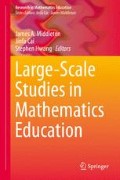Abstract
Over the years our community has benefitted greatly from the application of survey methods to the discernment of patterns in student mathematics performance, attitudes, and to some degree, policies and practices. In particular, such research has helped us discover differential patterns in socioeconomic, gender, and ethnic groups and point out that, as a system, mathematics curriculum and instruction has hardly been equitable to all students. From the National Center on Education Statistics (in the US), large scale studies such as High School and Beyond, the Longitudinal Study of American Youth, and the National Assessment of Educational Progress came important calls to focus attention on improving instruction for marginalized populations and to increase emphasis on more complex problem solving than had typically been the norm (Dossey & Wu, 2013).
Access this chapter
Tax calculation will be finalised at checkout
Purchases are for personal use only
References
Anderson, L. W., & Postlethwaite, T. N. (2007). Program evaluation: Large-scale and small-scale studies. International Academy of Education: International Institute for Education Planning. www.unesco.org/iiep/PDF/Edpol8.pdf.
Dossey, J. A., & Wu, M. L. (2013). Implications of international studies for national and local policy in mathematics education. In Third international handbook of mathematics education (pp. 1009–1042). New York: Springer.
Institute for Education Sciences, National Science Foundation. (2013). Common guidelines for education research and development. Washington, DC: IES. http://ies.ed.gov/pdf/CommonGuidelines.pdf.
Lakin, J. M., & Lai, E. R. (2012). Multigroup generalizability analysis of verbal, quantitative, and nonverbal ability tests for culturally and linguistically diverse students. Educational and Psychological Measurement, 72(1), 139–158.
Lamberg, T., & Middleton, J. A. (2009). Design research perspectives on transitioning from individual microgenetic interviews in a laboratory setting to a whole class teaching experiment. Educational Researcher, 38(4), 233–245.
Romberg, T. A., & Shafer, M. C. (2008). The impact of reform instruction on student mathematics achievement: An example of a summative evaluation of a standards-based curriculum. London: Routledge.
Roschelle, J., & Shechtman, N. (2013). SimCalc at scale: Three studies examine the integration of technology, curriculum, and professional development for advancing middle school mathematics. In S. P. Hegedus & J. Roschelle (Eds.), The SimCalc vision and contributions (pp. 125–143). Dordrecht, The Netherlands: Springer.
Roschelle, J., Tatar, D., Hedges, L., & Shechtman, N. (2010). Two perspectives on the generalizability of lessons from scaling up SimCalc. Paper presented at the Society for Research on Educational Effectiveness, Washington, DC.
Seltiz, C. (1976). Research methods in social relations. New York: Holt, Rinehart and Winston.
Shadish, W. R., Cook, T. D., & Campbell, D. T. (2002). Experimental and quasi-experimental designs for generalized causal inference. New York: Houghton Mifflin.
Thomas, S. L., Heck, R. H., & Bauer, K. W. (2005). Weighting and adjusting for design effects in secondary data analyses. New Directions for Institutional Research, 2005(127), 51–72.
Towne, L., & Shavelson, R. J. (Eds.). (2002). Scientific research in education. Washington, DC: National Academies Press.
Author information
Authors and Affiliations
Corresponding author
Editor information
Editors and Affiliations
Rights and permissions
Copyright information
© 2015 Springer International Publishing Switzerland
About this chapter
Cite this chapter
Middleton, J.A., Cai, J., Hwang, S. (2015). Why Mathematics Education Needs Large-Scale Research. In: Middleton, J., Cai, J., Hwang, S. (eds) Large-Scale Studies in Mathematics Education. Research in Mathematics Education. Springer, Cham. https://doi.org/10.1007/978-3-319-07716-1_1
Download citation
DOI: https://doi.org/10.1007/978-3-319-07716-1_1
Publisher Name: Springer, Cham
Print ISBN: 978-3-319-07715-4
Online ISBN: 978-3-319-07716-1
eBook Packages: Humanities, Social Sciences and LawEducation (R0)

